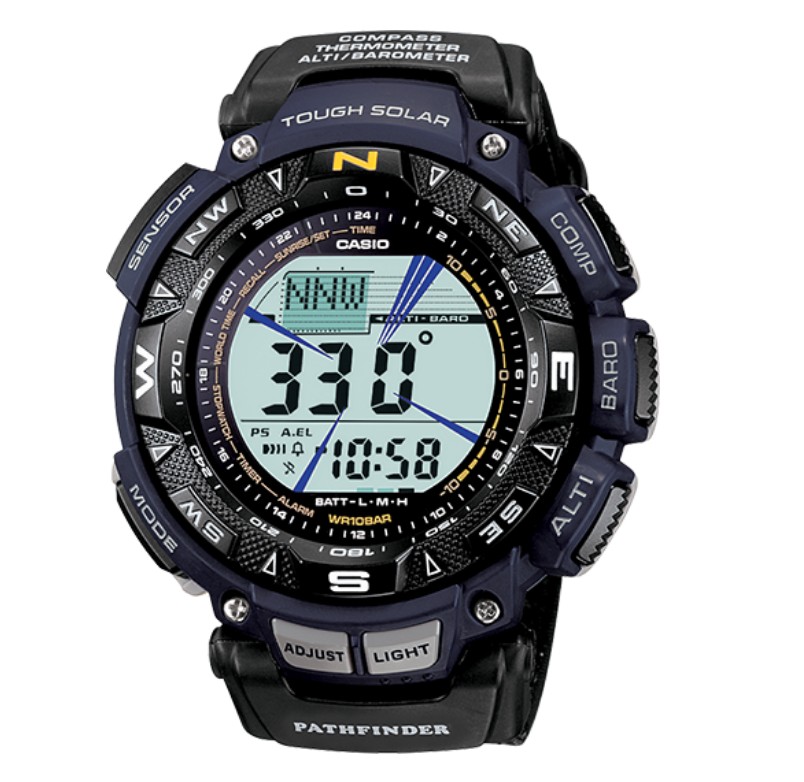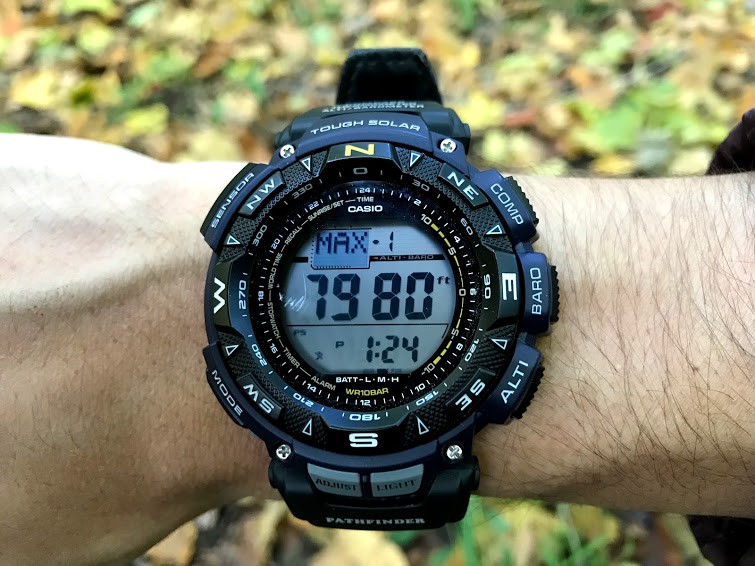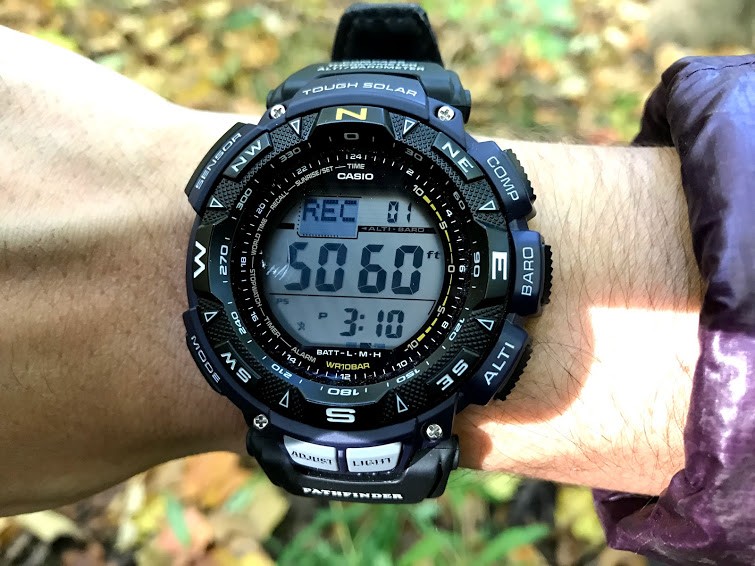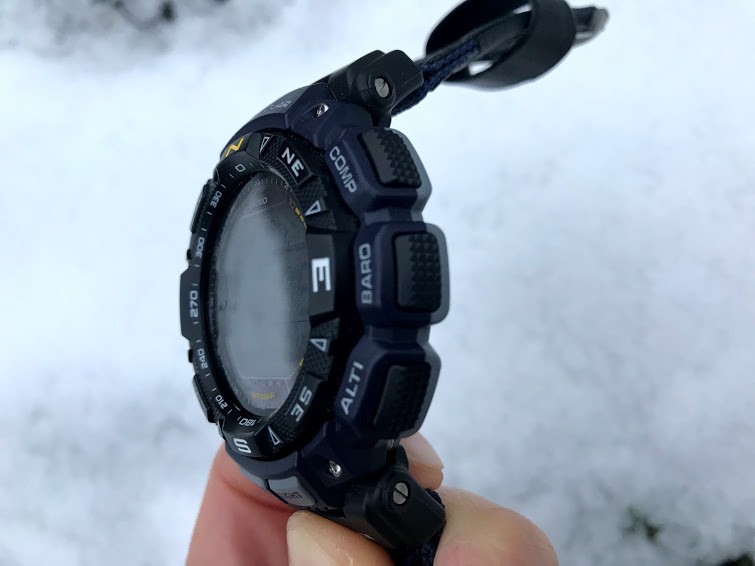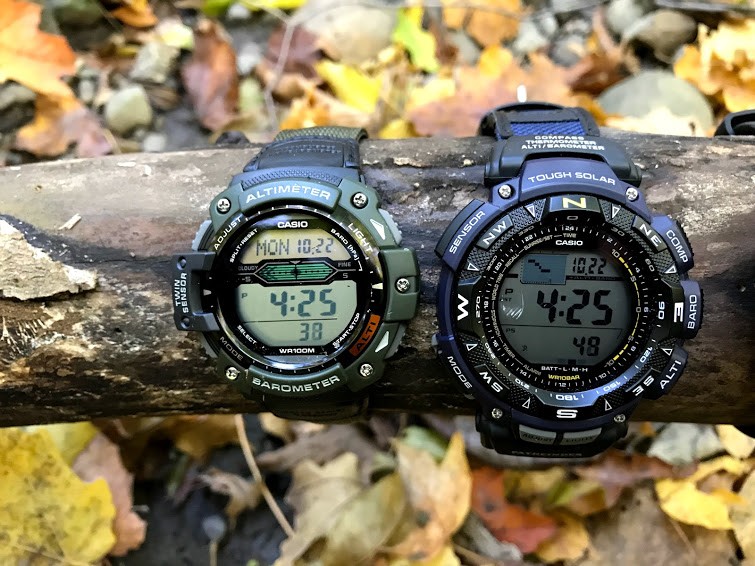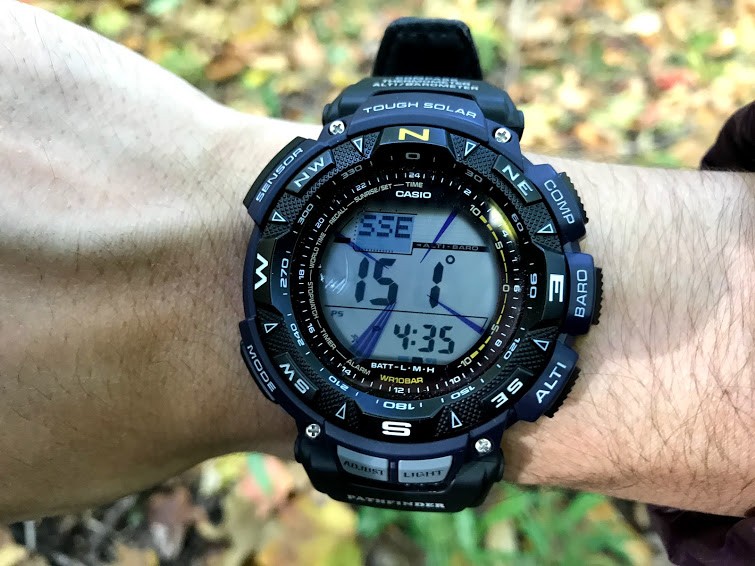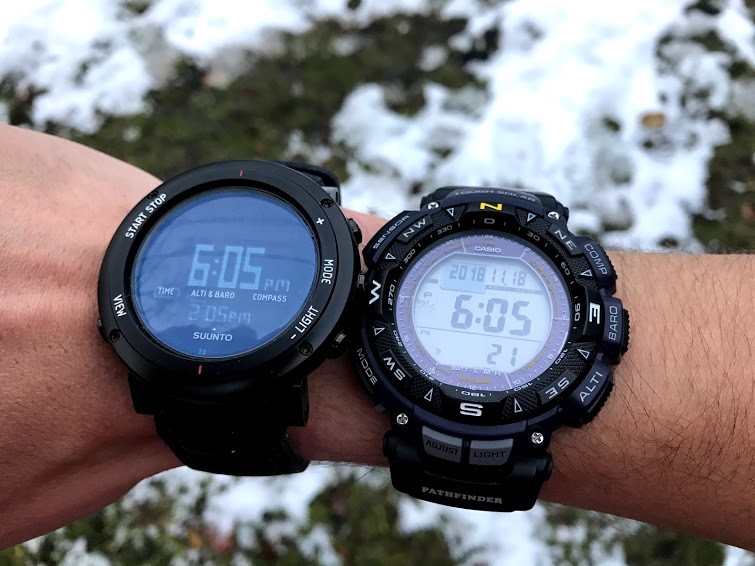Casio Pathfinder PAG240B-2 Review
Our Verdict
Our Analysis and Test Results
This watch scores well in battery life and ease of use metrics. Its feature set is nice but limited. The altimeter is accurate (if not a little imprecise), but it isn't very comfortable, and the display quality is uninspiring.
Performance Comparison
Altimeter Accuracy
This watch is a surprise for its accuracy. Its purely pressure-based reading stayed within a couple hundred feet of true elevation. Other watches do it better for sure, but for the price, we were impressed while we were on the move. Having said that, it measures altitude in 20ft/5m intervals, so it is not as precise as any of the Suunto or Garmin models. Another reason it doesn't score as well is that, as with other non-GPS watches, it is susceptible to misreading barometric pressure fluctuations as changes in altitude, which was noticeable when we left it in the same place prior to and during a storm.
Battery Life
The battery life is the most redeeming quality of this watch. It is solar-powered, so it never requires additional effort to charge. The tiny ring of solar cells around the circumference reduces the total area of digital watch face space, but it is well-integrated as a dark backdrop to light colored printed symbols layered on top.
The battery lasts for up to six months if not exposed to any additional light in that time. So take it to Alaska in the winter and enjoy. With regular light exposure, it lasts more or less forever. There is a low-medium-high charge level indicator at the very bottom of the watch face. During testing, it was exposed to a typical amount of autumnal sunlight in northern New England and it remained at medium charge the entire time. The battery is a huge advantage for those adventuring on multi-week or multi-month treks, or otherwise won't have reliable access to an electrical outlet while traveling.
User Experience
The Casio PAG240B-2 is simple to use, less simple to configure. Unlike some of the much higher-end models, the buttons to set the time and date are not super intuitive and require a little manual skimming to figure out the right sequence of buttons to press.
Once it's set though, it's fairly straightforward. There are alti, baro, and comp button for each of the three primary features. Pressing the mode button cycles through the regular timekeeper, sunset/sunrise, ascent/descent logs, world time, stopwatch, countdown timer and alarms in sequence.
We aren't huge fans of the throwback digital look of this watch. It's an entry to mid-range model, but Suunto has just slightly more expensive models that have a much sleeker look. We aren't convinced it couldn't be done at this price point. The green backlight is perhaps the weakest in the whole category. The glass proved to be susceptible to scratches as well. Throughout testing, this model got a little dinged up, with a noticeable and distracting scratch on the glass.
It's actually quite impressive how much information this watch is able to fit in such a small space. However, it's overwhelming to look at, and some of the symbols are extremely small, or easily overlooked. For example, there are a variety of digital radial lines that are layered on top of the watch face, which is activated depending on the function. They point to a variety of symbols that are a part of the outer plastic casing. Examples include numbers representing a change in barometric pressure or cardinal directions and degrees in compass mode. Once you adjust to what you are looking at, it's a serviceable interface, but there is a lot going on in one tiny area.
Features
This watch comes with basic ABC features as well as a thermometer and basic timekeeping functions. We are pleased with the simplicity and accuracy of most of them.
Altimeter
Because the watch is simple, the altimeter is easily accessible. It has its own alti button. Press it once and the watch will give your current elevation and the altitude gained and lost since it began that tracking event. There is also a very tiny display in the upper left corner that graphs a highly generalized elevation profile. It can store up to 40 logs that recall the date/time and total ascent/descent.
Barometer
Similarly, the barometer has its own baro button. One press and the pressure reading appears in hPa or inHg (depending on which unit you set it to). It also brings up a pressure differential graph and a thermometer. Like all other altimeter watches, the thermometer is influenced by the temperature of your wrist. For much higher accuracy, we recommend putting it around a pack strap or exterior pocket while on the move.
Compass
Just like the altimeter and barometer, the compass has a textured button. However, this feature can sometimes get a little confused. If you turn around too quickly, the reading disappears and you have to reactivate it. Just as with any altimeter watch compass, it offers a general reference point. If you are going off trail, bring an old-school compass.
Timekeeper
There are a variety of essential timekeeping functions that you can access with the mode button. The month and day are displayed on the default watch face. With one press, you can see the sunset and sunrise times in your area. A couple more presses bring up your configured world time, and successive presses bring up the stopwatch, countdown timer, and five alarms.
Comfort and Fit
The wristband really leaves something to be desired. The fabric/pleather combination holds on to quite a bit of water, which can rub and irritate the skin. The strap is also fairly rigid, so it doesn't conform well to individual wrists. It is oddly challenging to put on and remove (again due to the rigidity of the band) and the strap tab is cheap and difficult to adjust.
Though the digital watch face is comparatively small, the diameter of the watch is still fairly large, adding to its clunkiness. All-in-all, this is definitely one to wear on a pack strap rather than your wrist.
Value
We aren't convinced that this model is worth the investment. It's sort of in a world of its own. If it just so happens to land at the right price point for you, and that range is narrow, then you'll get a decent, fairly accurate watch for your money. However, if you are primarily in the market for a device that can tell you your current elevation, we would recommend the much less expensive Casio SGW-300H. If you can afford to move into the $400 altimeter-watch bracket, we think you get a lot more for your money with any of the Suunto models we tested in that range.
Conclusion
The Casio Pathfinder PAG240B-2 has some good basic features and decent technology to back them up. It suffers a little bit from a lack of style and comfort, which may ultimately impact how frequently you end up using it.


